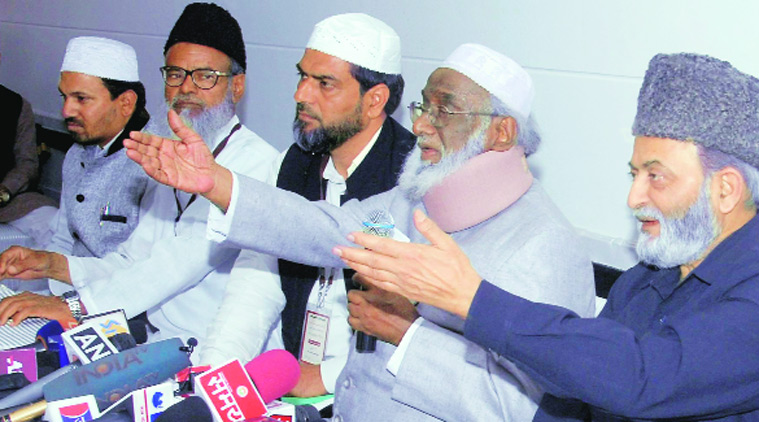
Image: Indian Express
The Urdu media was also far more direct in its criticism of the Modi government for claiming victory, saying the Centre ought to improve the lot of the Muslim community instead of politicising it and extending only lip sympathy. Several Urdu newspapers, including Inquilab, Roznama Sahara, Siasat, Jadid Khabar and Nadeem, published in Delhi, Lucknow, Hyderabad, Bangalore and Bhopal, have written strong editorials and commentaries calling upon community leaders to see reason.
Syed Faisal Ali of Roznama Sahara lamented how Muslim community leaders had missed an opportunity to bring in reforms from within. Without naming the board, he urged the clergy to seek wider consultations and take into account the feelings of women and community members in general before taking a stand at the Bhopal meeting. Masoom Moradabadi, the editor of Jadid Khabar, felt that the Muslim leadership must wake up to emerging social realities and move on with time. “Islam offers solutions to all issues pertaining to the community. The question is whether we are exploring that or not,” he wrote.
The leading article in the Inquilab voiced the widespread sentiment that the AIMPLB and other opinion makers in the community failed to initiate much-needed reforms, culminating in the Supreme Court verdict.
In the editorial headlined ” Teen talaq aur Supreme Court ka faisla”, the Inquilab said: “The Supreme Court has not said anything on triple talaq but pronounced the instant talaq illegal. It was a responsible judgment and should be applauded.”The editorial was critical of the way BJP president Amit Shah called a media conference to say it was a “historic” judgment.
“There is no discussion on the socio-economic condition of Muslims, especially roti, kapda aur makaan, but triple talaq. If they (the ruling party) are really champions of Muslims, they should initiate welfare schemes for the community’s betterment. Only lip service is useless,” it said.
Role of the AIMLB
Any ambiguity on the part of the board could create problems when violations prompt police action and prosecution under the domestic violence act.However, if the board endorses the verdict, it will help eradicate the practice. Sources have told Sabranfindia that while a majority view in the board is in favour of a formal stand against divorce at one go. However, some influential members do not want a dilution.Many members of the AIPLB even wish to distance themselves from the affdavit it had submitted before the SC. Their reservations stem from a fear that the abrogation of the instant triple talaq might be used as a stepping stone by the Narendra Modi government to push through a uniform civil code. Lawyers in the law board are drawing solace from the majority verdict that did not question the application of personal laws in civil matters.
The Jamiat Ulama-i-Hind, which has nearly 10 million members, held a meeting and issued an appeal against the instant triple talaq, citing a reason. “Muslims must, under all circumstances, avoid the practice of the instant triple talaq so that others cannot find ways to interfere in our religious matters,” said a statement by general secretary Maulana Mahmood Madani.
AIMPLB members belonging to the Bohra, Shia and other small sects want board president Maulana Rabey Nadvi to declare the instant triple talaq unlawful at the Bhopal meeting.They feel such an upfront stand will “enhance the prestige” of the board, send a positive message to Muslim women and project the outfit as a law-abiding, gender-sensitive body. In many Muslim sects, the instant triple talaq was already illegal.
“The board maintained silence on the issue on the pretext that it’s under the Shariat law but the top court has outlawed it. What had to be done by the Muslim community has now been done by the Supreme Court. The board members should have been realistic and taken the issue seriously but they did not. If they fail to address other issues concerning the community and fail to bring about reforms even after this verdict, the board will not only become redundant but its very existence will be at stake,” it said.The editorial said the sooner the Muslim leadership embark on the journey of initiating reforms, the sooner they can advance.Jadid Khabar said the ruling party raised the triple talaq for political gains and to ensure that Muslims remained entangled in their problems and did not prosper. It accused the government of sowing seeds of hatred in the country and raising insignificant issues rather than maintaining peace and harmony.
Terming the top court’s judgment “historic”, Hamara Samaj justified the celebration among women who had fought for their rights.